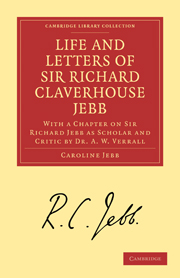 Life and Letters of Sir Richard Claverhouse Jebb, O. M., Litt. D.
Life and Letters of Sir Richard Claverhouse Jebb, O. M., Litt. D. Published online by Cambridge University Press: 07 September 2010
For some years, while Robert Jebb was still active in his profession, the family home was in Dublin. Here the little “Dick” passed his early childhood amid surroundings peculiarly suited to his sensitive affectionate nature and quick intellect. Not only his parents but his mother's two sisters, Frances and Eglantyne Horsley, found in the eager, beautiful boy their chief interest in life. Full of vitality and intelligence as he was, even his faults were engaging. He had a passionate temper as quickly allayed as it was excited. When he was two years old his Aunt Eglantyne offended him by laughing (as he thought) at him. Like a flash, yet gently, his hands flew to her cap, pulled it off and threw it on the floor. “Aunty sorry,” he remarked triumphantly; adding the instant after, “Dicky sorry too,” as he burst into tears and threw his arms around her neck. Miss Horsley told me it was impossible to express what a delight he was to them all. Notwithstanding his quick temper, he was a very good child, easily governed by affection. A look of disapproval from his mother made him miserable: to disappoint anyone who loved him was all his life intolerable to him. “Dick sorry; forgive your Dick” was a phrase not confined to childhood. He was also naturally obedient and law-abiding, with a respect for authority.
If affection could ever spoil, I am afraid his adoring “Aunt Fanny” was guilty. He had a vivid recollection of the pastry-cook's shop to which he always turned her steps when taken out for a walk by her.
To save this book to your Kindle, first ensure [email protected] is added to your Approved Personal Document E-mail List under your Personal Document Settings on the Manage Your Content and Devices page of your Amazon account. Then enter the ‘name’ part of your Kindle email address below. Find out more about saving to your Kindle.
Note you can select to save to either the @free.kindle.com or @kindle.com variations. ‘@free.kindle.com’ emails are free but can only be saved to your device when it is connected to wi-fi. ‘@kindle.com’ emails can be delivered even when you are not connected to wi-fi, but note that service fees apply.
Find out more about the Kindle Personal Document Service.
To save content items to your account, please confirm that you agree to abide by our usage policies. If this is the first time you use this feature, you will be asked to authorise Cambridge Core to connect with your account. Find out more about saving content to Dropbox.
To save content items to your account, please confirm that you agree to abide by our usage policies. If this is the first time you use this feature, you will be asked to authorise Cambridge Core to connect with your account. Find out more about saving content to Google Drive.